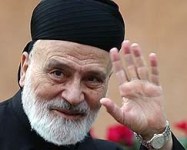 ST. LOUIS POST-DISPATCH, At a meeting with religious leaders Saturday, Lebanese Cardinal Nasrallah Peter Sfeir, patriarch of the Maronite Catholic Church, stressed the need for people of all faiths to help quell global conflict that is often rooted in religious difference."Each of us has a responsibility to look after each other," he said. "We can co-exist in harmony and respect for each other if we keep love in our hearts."
ST. LOUIS POST-DISPATCH, At a meeting with religious leaders Saturday, Lebanese Cardinal Nasrallah Peter Sfeir, patriarch of the Maronite Catholic Church, stressed the need for people of all faiths to help quell global conflict that is often rooted in religious difference."Each of us has a responsibility to look after each other," he said. "We can co-exist in harmony and respect for each other if we keep love in our hearts."
Sfeir spoke to roughly two dozen leaders of various St. Louis faith groups – Mormons, Muslims, Quakers, Roman Catholics – at an interfaith event at St. Raymond’s Maronite Catholic Parish, 931 Lebanon Drive, St. Louis. Sfeir is in St. Louis for a four-day pastoral visit. He will also be stopping in Chicago and New York City.
During his time in St. Louis, Sfeir’s main message was one of hope and peace. At Saturday’s interfaith event, Ghazala Hayat, president of the Interfaith Partnership of Metropolitan St. Louis, asked Sfeir if it was possible to have peace in the Middle East.
"When politics intervenes, it is sometimes hard to see people living together," said Sfeir. "But religion has no material interest. Religion has only God, and if we all pray to God as one, all humanity will be together as brothers."The patriarch is one of the most significant religious figures to visit St. Louis since Pope John Paul II came to the city in 1999.The Maronite Church, an ancient Eastern Rite branch of Catholicism, is based in Lebanon. St. Raymond’s, in St. Louis’ LaSalle Park neighborhood, is the seat of one of two eparchies, or dioceses, of the Maronite Church in the U.S. Sfeir lives in Bkerke, north of Beirut.
Local honors
St. Louis Mayor Francis Slay, a Maronite Catholic and a lifelong member of St. Raymond’s (his father runs the church’s banquet hall), greeted Sfeir at Lambert Field on Thursday with a key to the city.
On Friday, the Rev. Lawrence Biondi, president of St. Louis University, gave the patriarch the university’s highest honor, the Sword of Ignatius Loyola. Named for Jesuit founder Inigo Lopez de Loyola, the award is given "to those who have given themselves to humankind for the greater glory of God." Past recipients include President Harry S. Truman and Katherine Dunham.
Bishop Robert J. Shaheen, the first American-born bishop of the Maronite Catholic Church, is the head of the diocese, called the Eparchy of Our Lady of Lebanon, headquartered at St. Raymond’s.
More than a million Maronite Catholics live in the U.S., according to the Rev. Andre Mhanna, rector of St. Raymond’s, and more than 40,000 people in the St. Louis area are "connected to Lebanon in some way."
The church counts more than five million Maronites around the globe, though there are fewer than a million Maronites left in Lebanon. Maronite Catholics make up slightly less than a quarter of Lebanon’s population of about 4 million.
Sfeir, the 76th patriarch of the Maronite Church, is referred to as His Beatitude and Eminence, Patriarch of Antioch and All the East. In the New Testament, Acts 11:26 says that "it was in Antioch that the disciples were first called ‘Christians.’"
In the late fourth century, a group of Christians who had formed a community around an Antiochene hermit named St. Maron established a monastery. In the seventh century, the Maronites were forced to move into the hills of Lebanon in the wake of conflicts with Muslims. They lived there for centuries, eventually becoming a church community whose leader took the title of Patriarch of Antioch and All the East.
In the 12th century, the Maronite Church officially established its union with the Latin or Western Rite Catholic Church, and has been in full communion with the Vatican ever since. Sfeir, who is 86, was made a cardinal by Pope John Paul II in 1994 – the third Maronite cardinal in history.
The patriarch is not just a religious figure, he’s also a political player in the Middle East. David Schenker, a senior fellow in Arab politics at the Washington Institute for Near East Policy, said Sfeir "has tremendous political and moral standing in Lebanon."
Last year, Sfeir met with President George W. Bush in the White House and in February, Secretary of State Condoleezza Rice paid the patriarch a visit at his residence outside Beirut rather than meet with Lebanon’s Syria-backed president, Emile Lahoud.
Lebanon’s tradition mandates that the president be Maronite, the prime minister a Sunni Muslim and the speaker of the parliament a Shiite Muslim.
As leader of the community that provides his country’s president, Sfeir is in a unique position to influence Lebanese – and Middle East – politics, say experts. "But he’s cautious about that role and knows the sway he holds," said Schenker.
In a country where Christians are the minority, Christian leaders must work closely with Muslims. "Lebanese Muslims and Christians respect him as a religious and political leader," said Mohamad Alhabi, a Lebanese Sunni who has lived in St. Louis for 25 years.



